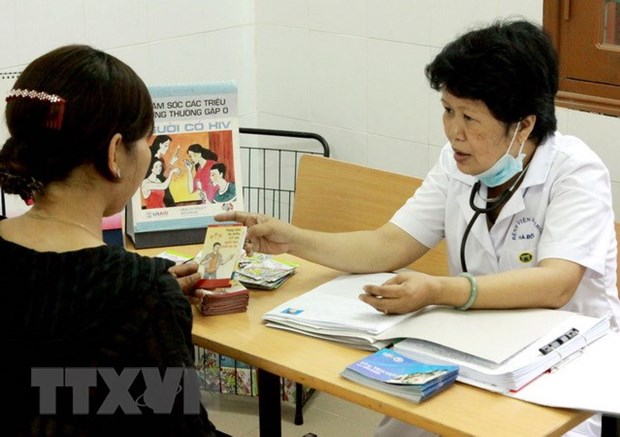 Illustrative image (Source: VNA)
Illustrative image (Source: VNA) Hanoi (VNA) – A workshop was held in Hanoi on May 22 to gather ideas for the
building of a national action plan to eliminate the transmission of HIV, hepatitis B and syphilis from
mothers to children.
Addressing the event, Deputy Minister of Health Nguyen Viet
Tien noted that the transmission of these diseases from mother to child causes
many consequences, greatly affecting the health of mothers and children, stressing
the ministry’s determination to complete the goals of erasing mother-to-child
transmission of these diseases.
He said that pregnant women lack access to health services in
remote, border and island areas, creating a major challenge for the national
programme to eliminate the diseases.
The Ministry of Health’s Maternal and Child
Health Department reported that the rate of HIV infection among the country’s
two million pregnant women every year is 0.25 percent.
At the same time, Vietnam is one of the
countries with the highest prevalence of hepatitis B virus in the world, at
10-20 percent. Therefore, the prevalence of hepatitis B virus among
pregnant women is also high.
According to
the Central Dermatology Hospital’s latest report, the incidence
of congenital syphilis in newborns is on the rise.
A draft on the National Action Plan to eliminate
the , hepatitis B and syphilis from mothers to children in
the 2018-2030 period has been completed by the Ministry of Health.
The plan will focus on key solutions:
strengthening communication and finance, innovating new methods of treatment
and enhancing the quality of health services such as screening, diagnosis, care
and treatment for mothers and children.
At the workshop, participants discussed issues
such as antenatal care and pre-testing for disease discovery, interventions for
pregnant women, , funding for the implementation of
the plan, inter-sector coordination and monitoring.
According to the World Health Organisation (WHO),
in the western Pacific Region, every year, about 180,000 people are infected
with , 13,000 children are infected with syphilis and 1,400 children
are infected with HIV.
These diseases can be prevented through simple
and accessible interventions, including pre-testing for pregnant women and
vaccination of infants after birth.
Participants at the workshop agreed that in Vietnam,
there is a lack of coordination among medical service providers such as
clinics, hospitals and grass-roots health centres. This restricts mothers and
infants from accessing advanced medical services and limits the effectiveness
of medical intervention.
WHO has developed a framework for the
elimination of HIV, hepatitis B and from mothers to children in the
Asia-Pacific region for the 2018-2030 period and recommended member states
develop national action plans to eliminate mother-to-child transmission of the
three diseases by 2030.-VNA
Source: VietnamPlus
